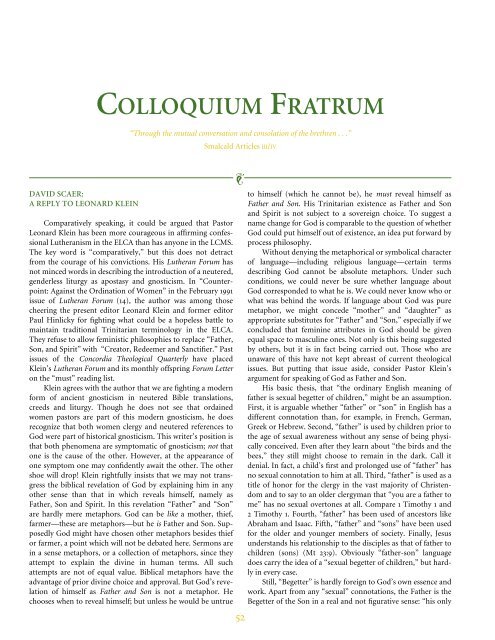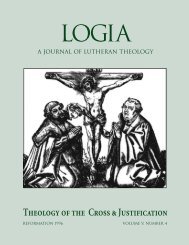03-1 Pastoral Care.pdf
03-1 Pastoral Care.pdf
03-1 Pastoral Care.pdf
- No tags were found...
You also want an ePaper? Increase the reach of your titles
YUMPU automatically turns print PDFs into web optimized ePapers that Google loves.
COLLOQUIUM FRATRUM“Through the mutual conversation and consolation of the brethren . . .”Smalcald Articles III/IVDAVID SCAER:A REPLY TO LEONARD KLEINComparatively speaking, it could be argued that PastorLeonard Klein has been more courageous in affirming confessionalLutheranism in the ELCA than has anyone in the LCMS.The key word is “comparatively,” but this does not detractfrom the courage of his convictions. His Lutheran Forum hasnot minced words in describing the introduction of a neutered,genderless liturgy as apostasy and gnosticism. In “Counterpoint:Against the Ordination of Women” in the February 1991issue of Lutheran Forum (14), the author was among thosecheering the present editor Leonard Klein and former editorPaul Hinlicky for fighting what could be a hopeless battle tomaintain traditional Trinitarian terminology in the ELCA.They refuse to allow feministic philosophies to replace “Father,Son, and Spirit” with “Creator, Redeemer and Sanctifier.” Pastissues of the Concordia Theological Quarterly have placedKlein’s Lutheran Forum and its monthly offspring Forum Letteron the “must” reading list.Klein agrees with the author that we are fighting a modernform of ancient gnosticism in neutered Bible translations,creeds and liturgy. Though he does not see that ordainedwomen pastors are part of this modern gnosticism, he doesrecognize that both women clergy and neutered references toGod were part of historical gnosticism. This writer’s position isthat both phenomena are symptomatic of gnosticism; not thatone is the cause of the other. However, at the appearance ofone symptom one may confidently await the other. The othershoe will drop! Klein rightfully insists that we may not transgressthe biblical revelation of God by explaining him in anyother sense than that in which reveals himself, namely asFather, Son and Spirit. In this revelation “Father” and “Son”are hardly mere metaphors. God can be like a mother, thief,farmer—these are metaphors—but he is Father and Son. SupposedlyGod might have chosen other metaphors besides thiefor farmer, a point which will not be debated here. Sermons arein a sense metaphors, or a collection of metaphors, since theyattempt to explain the divine in human terms. All suchattempts are not of equal value. Biblical metaphors have theadvantage of prior divine choice and approval. But God’s revelationof himself as Father and Son is not a metaphor. Hechooses when to reveal himself; but unless he would be untrue52to himself (which he cannot be), he must reveal himself asFather and Son. His Trinitarian existence as Father and Sonand Spirit is not subject to a sovereign choice. To suggest aname change for God is comparable to the question of whetherGod could put himself out of existence, an idea put forward byprocess philosophy.Without denying the metaphorical or symbolical characterof language—including religious language—certain termsdescribing God cannot be absolute metaphors. Under suchconditions, we could never be sure whether language aboutGod corresponded to what he is. We could never know who orwhat was behind the words. If language about God was puremetaphor, we might concede “mother” and “daughter” asappropriate substitutes for “Father” and “Son,” especially if weconcluded that feminine attributes in God should be givenequal space to masculine ones. Not only is this being suggestedby others, but it is in fact being carried out. Those who areunaware of this have not kept abreast of current theologicalissues. But putting that issue aside, consider Pastor Klein’sargument for speaking of God as Father and Son.His basic thesis, that “the ordinary English meaning offather is sexual begetter of children,” might be an assumption.First, it is arguable whether “father” or “son” in English has adifferent connotation than, for example, in French, German,Greek or Hebrew. Second, “father” is used by children prior tothe age of sexual awareness without any sense of being physicallyconceived. Even after they learn about “the birds and thebees,” they still might choose to remain in the dark. Call itdenial. In fact, a child’s first and prolonged use of “father” hasno sexual connotation to him at all. Third, “father” is used as atitle of honor for the clergy in the vast majority of Christendomand to say to an older clergyman that “you are a father tome” has no sexual overtones at all. Compare 1 Timothy 1 and2 Timothy 1. Fourth, “father” has been used of ancestors likeAbraham and Isaac. Fifth, “father” and “sons” have been usedfor the older and younger members of society. Finally, Jesusunderstands his relationship to the disciples as that of father tochildren (sons) (Mt 23:9). Obviously “father-son” languagedoes carry the idea of a “sexual begetter of children,” but hardlyin every case.Still, “Begetter” is hardly foreign to God’s own essence andwork. Apart from any “sexual” connotations, the Father is theBegetter of the Son in a real and not figurative sense: “his only
















